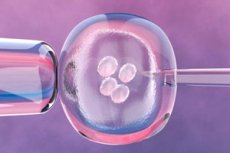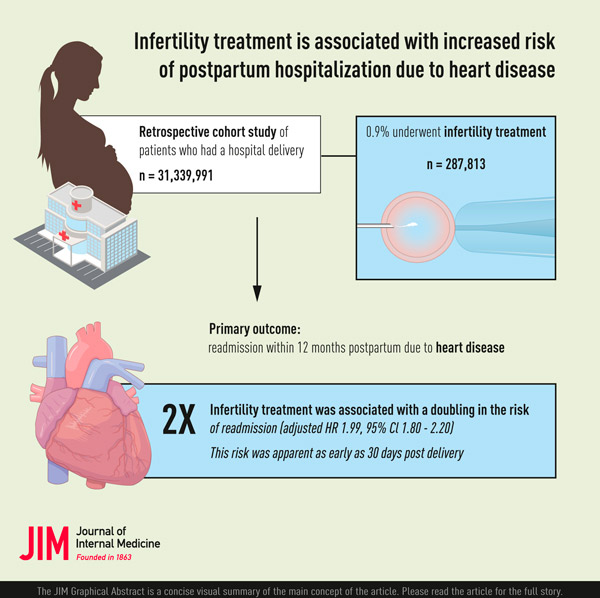Nye publikasjoner
Infertilitetsbehandling dobler risikoen for hjertesykdom i perioden etter fødselen
Sist anmeldt: 02.07.2025

Alt iLive-innhold blir gjennomgått med medisin eller faktisk kontrollert for å sikre så mye faktuell nøyaktighet som mulig.
Vi har strenge retningslinjer for innkjøp og kun kobling til anerkjente medieområder, akademiske forskningsinstitusjoner og, når det er mulig, medisinsk peer-evaluerte studier. Merk at tallene i parenteser ([1], [2], etc.) er klikkbare koblinger til disse studiene.
Hvis du føler at noe av innholdet vårt er unøyaktig, utdatert eller ellers tvilsomt, velg det og trykk Ctrl + Enter.

En studie utført av forskere ved Rutgers Health fant at pasienter som gjennomgikk fertilitetsbehandling hadde dobbelt så stor sannsynlighet for å bli innlagt på sykehus for hjertesykdom innen et år etter fødselen enn de som ble unnfanget naturlig.
Pasienter som hadde gjennomgått fertilitetsbehandling hadde særlig sannsynlighet – 2,16 ganger større sannsynlighet enn de som ble unnfanget naturlig – for å bli innlagt på sykehus med farlig høyt blodtrykk eller hypertensjon.
«Etterfødselskontroller er nødvendige for alle pasienter, men denne studien antyder at de er spesielt viktige for pasienter som har gjennomgått fertilitetsbehandling for å oppnå unnfangelse», sa Ray Yamada, en spesialist i obstetrikk og gynekologi ved Rutgers University Robert Wood Johnson Medical School og hovedforfatter av studien.
Studieforfatterne sier at funnene deres støtter standarder for behandling som nå krever en innledende postpartum-kontroll tre uker etter fødselen, standarder som noen helsesystemer ennå ikke har tatt i bruk. Mesteparten av den økte risikoen oppsto i den første måneden etter fødselen, spesielt hos pasienter som utviklet farlig høyt blodtrykk.
«Og disse funnene er ikke de eneste som peker på behovet for tidlig oppfølging», sa Kande Anant, sjef for epidemiologi og biostatistikk ved avdelingen for obstetrikk, gynekologi og reproduksjonsvitenskap ved Rutgers University Robert Wood Johnson Medical School og seniorforfatter av studien. «I løpet av de siste årene har vi vært involvert i en rekke studier som har funnet betydelig risiko for hjertesykdom og hjerneslag hos en rekke høyrisikogrupper av pasienter i løpet av de første 30 dagene etter fødselen – risikoer som kan reduseres med tidlig oppfølging.»

Grafisk sammendrag. Kilde: Journal of Internal Medicine (2024). DOI: 10.1111/joim.13773
Studien analyserte den nasjonale databasen for reinnleggelser, som inneholder nasjonalt representative data om omtrent 31 millioner sykehusutskrivelser og reinnleggelser per år. Databasen inneholder diagnosekoder som lar forskere målrette spesifikke populasjoner og identifisere årsaker til reinnleggelser.
Forskerne brukte data fra mer enn 31 millioner pasienter som ble utskrevet etter fødsel fra 2010 til 2018, inkludert 287 813 pasienter som gjennomgikk infertilitetsbehandling.
Selv om fertilitetsbehandling forutså en kraftig økning i risikoen for hjertesykdom, bemerket studieforfatterne at den relativt unge alderen til pasientene som fikk fertilitetsbehandling holdt den totale risikoen ganske lav. Bare 550 av 100 000 kvinner som fikk fertilitetsbehandling og 355 av 100 000 kvinner som ble gravide naturlig, ble innlagt på sykehus for hjerte- og karsykdommer i året etter fødselen.
Årsaken til den økte risikoen for hjertesykdom forbundet med infertilitetsbehandlinger er fortsatt uklar. Den økte risikoen for hjertesykdom kan være relatert til selve infertilitetsbehandlingene, til de underliggende medisinske problemene som gjorde pasientene infertile, eller til en annen årsak.
«I fremtiden vil jeg gjerne se om ulike typer fertilitetsbehandlinger og, viktigst av alt, medisiner er forbundet med ulike risikonivåer», sa Yamada. «Dataene våre ga ikke informasjon om hvilke pasienter som fikk hvilke behandlinger. Mer detaljert informasjon kan også gi innsikt i hvordan fertilitetsbehandlinger påvirker kardiovaskulære utfall.»
Arbeidet ble publisert i Journal of Internal Medicine.
